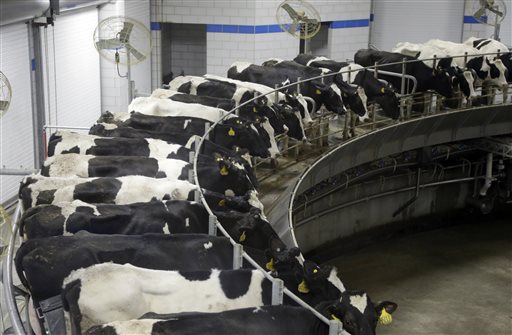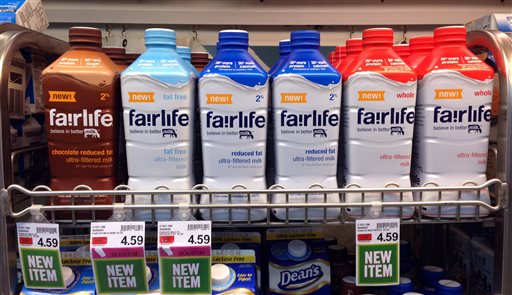Coke bets on ‘premium milk’ to boost category

In this Monday, Jan. 26, 2015 photo, cows are milked on one of the carousels in a milking parlor on the Fair Oaks Farms in Fair Oaks, Ind. Fairlife, which is rolling out nationally in coming weeks, is the product of a joint venture between Select Milk Producers, a dairy cooperative, and Coca-Cola. AP
NEW YORK — Coke is coming out with premium milk that has more protein and less sugar than regular. And it’s betting people will pay twice as much for it.
The national rollout of Fairlife over the next several weeks is one way the world’s biggest beverage maker is seeking to diversify its offerings as Americans continue turning away from soft drinks.
It also comes as people increasingly seek out some type of functional boost from their foods and drinks, whether it’s more fiber, antioxidants or protein. That has left the door open for Coke step into the milk case, where the differences between options remain relatively minimal.
“It’s basically the ‘premiumization’ of milk,” Sandy Douglas, president of Coca-Cola North America, said at an analyst conference in November. If developed properly, Douglas said it is the type of product that “rains money.”
Fairlife, which Coca-Cola formed in partnership with dairy cooperative Select Milk Producers in 2012, says its milk goes through a filtration process that’s akin the way skim milk is made. Filters are used to separate the various components in milk. Then, more of the favorable components are added, while the less favorable ones are taken out.
Fairlife says its milk has 50 percent more protein, 30 percent more calcium and 50 percent less sugar than regular milk, and is lactose free.
The same process is used make Fairlife’s Core Power, a drink marketed to athletes that has even more protein and calcium than Fairlife milk.

In this Friday, Jan. 23, 2015 photo, Fairlife milk products appear on display in the dairy section of an Indianapolis grocery store. The product is filtered to have more protein and less sugar than regular milk. AP
Sue McCloskey, who developed the system used to make Fairlife with her husband Mike McCloskey, said Fairlife milk will be marketed more broadly to women who are the “gatekeepers” for their families’ nutritional needs.
Even while touting its nutritional advantages, however, Fairlife will need to be careful about communicating how its drink is made. Jonas Feliciano, senior beverage analyst for market researcher Euromonitor, noted people increasingly want drinks that “do something for me,” but that Fairlife’s juiced-up nutritional stats may make people hesitant about how natural it is.
“They have to explain that this is not an abomination of nature,” Feliciano said.
Already, Fairlife has been subject to some teasing. After the drink was referenced in Coke’s analyst presentation, comedian Stephen Colbert referred to it as “extra expensive science milk” and made fun of the elaborate way it’s made.
“It’s like they got Frankenstein to lactate,” he said.
Colbert also took a dig at the wholesome image Fairlife is trying to project, noting that it’s made by the “nature loving health nuts at Coca-Cola.” That may explain why Coca-Cola is distancing itself from the product; a representative for the Atlanta-based company referred questions to Fairlife’s outside representative.
In a phone interview, Fairlife CEO and former Coke executive Steve Jones said he thinks his company can help reverse the decades-long decline in milk consumption. Already, major retailers including Wal-Mart, Target, Kroger and Safeway have agreed to carry it.
The drink has already started appearing on shelves and is expected to continue rolling out nationally over the next several weeks. It comes in sleek, plastic bottles reminiscent of milk cartons.
At a supermarket in Indianapolis, a 52-ounce bottle of Fairlife was being sold for $4.59. By comparison, the national average cost for a half-gallon of milk, which is 64 ounces, is $2.18, according to the USDA. For organic milk, the average is $3.99.
Fairlife is just one of many ventures by Coca-Cola, which also recently took stakes in energy drink maker Monster Beverages and Keurig Green Mountain, which makes single-serving coffee machines and pods.
Over time, Coca-Cola is hoping Fairlife can become a significant driver of growth. For now, Fairlife is still trying to find its footing in the marketplace.
This summer, the company ran ads in the test markets of Minneapolis and Denver featuring women wearing nothing but milk splashes in the shape of dresses. The images were accompanied by phrases like, “Better Milk Looks Good On You,” leading them to be deemed sexist in some corners.
Jones said the ads were intended to be “disruptive,” since new products need to grab people’s attention.
But moving forward, he said Fairlife will focus on its authentic milk taste in national marketing, which will roll out around the end of March or April.
While declining to provide details, Jones said Fairlife intends to “crank up the awareness level very, very quickly.”
RELATED STORIES
They never left: Coca-Cola rises with Tacloban
Coke back in Myanmar officially after 60 years














